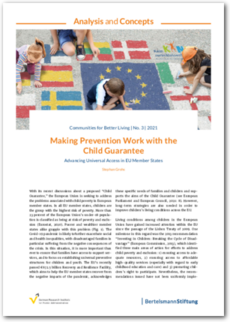Advancing Universal Access in EU Member States
Bertelsmann Stiftung (ed.)
Prof. Dr. Stephan Grohs, Deutsches Forschungsinstitut für öffentliche Verwaltung, Speyer
Making Prevention Work with the Child Guarantee
- Format Type
- Broschur
- Date of publication
- 18/03/2021
- DOI
- 10.11586/2021033
- Edition
- 1. edition 2021
- Volume/Format
- 12 pages, Broschur
- Delivery status
- Lieferbar
Format
-
Brochure
Price
Free of charge
shipment within 3-5 days
Description
With its recent discussions about a proposed “Child Guarantee,” the European Union is seeking to address the problems associated with child poverty in European member states. In all EU member states, children are the group with the highest risk of poverty. More than 23 percent of the European Union’s under-18 population is classified as being at risk of poverty and exclusion.
The comparative study informing this policy brief identifies and analyzes preventive structures and policies for children, young people and families in 12 European countries, including Austria, Czechia, Denmark, England (UK), Finland, France, Germany, Ireland, Lithuania, the Netherlands, Spain and Sweden.
Our study identified a wide range of deficits in Europe’s preventive structures, as well as a huge variety of preventive concepts, interpretations and measures. The present paper’s aim is to systematically collect and identify these different manifestations of prevention, and to map state-led approaches to fostering universal preventive services. Such a comparison should be able to identify common challenges, allowing the development of recommendations for policymakers at the member-state and EU level.


 >
>


